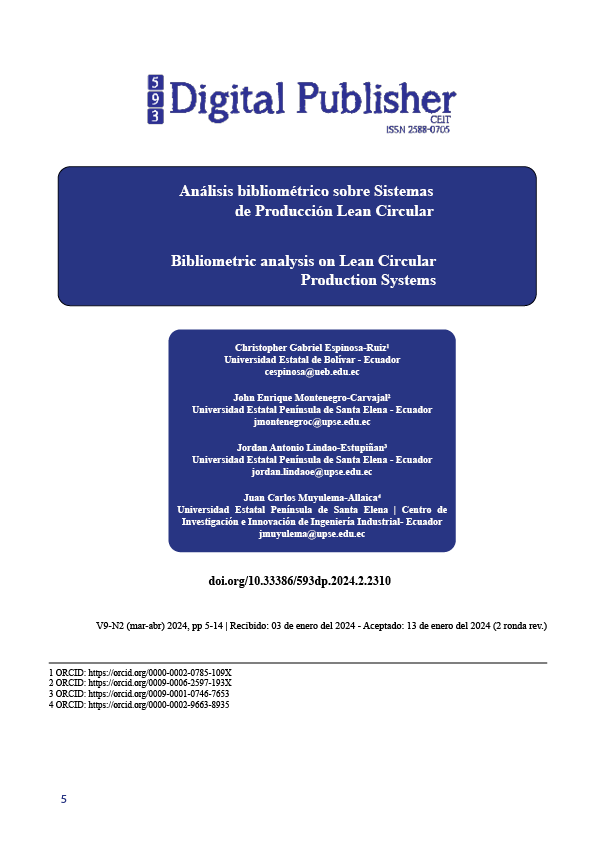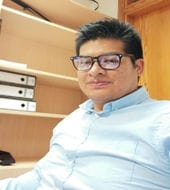Bibliometric analysis on Lean Circular Production Systems
Main Article Content
Abstract
The integration of Lean Manufacturing (LM) and Circular Economy (CE) provides a holistic approach, encompassing economic, social, political and environmental sustainability in three key areas: process, product and life cycle thinking in companies. Studies have shown a positive correlation between LM and CE taking place within the Lean Circular (LC) literature. The main objective of this study is to answer the following questions: Which are the countries worldwide that have generated a great scientific contribution regarding LC in the last four years? and Which organizations are the most interacting with each other in order to disseminate relevant information on LC? The methodology used included a systematic literature review (SLR). Therefore, there was scope to apply a bibliometric analysis tool and technique. In order to identify research hotspots, thematic areas, trending topics, knowledge base, VOSviewer was used for the analysis. The results showed that the countries that have made the greatest commitment to research are Sweden, which has made the greatest contribution, followed by Italy and the United Kingdom. Similarly, when comparing the countries that have generated the highest number of citations of their articles, it was determined that the United Kingdom, India and Australia are the countries that occupy the first three places. When correlating the organizations, it was found that few organizations have generated productive content in terms of published papers on LC. According to the publications that have been generated, it can be observed that those that give more importance to the research topic are the universities of the Asian and British continent. Finally, the research gaps and the future scope of the field are highlighted
Downloads
Article Details

This work is licensed under a Creative Commons Attribution-NonCommercial-ShareAlike 4.0 International License.
1. Derechos de autor
Las obras que se publican en 593 Digital Publisher CEIT están sujetas a los siguientes términos:
1.1. 593 Digital Publisher CEIT, conserva los derechos patrimoniales (copyright) de las obras publicadas, favorece y permite la reutilización de las mismas bajo la licencia Licencia Creative Commons 4.0 de Reconocimiento-NoComercial-CompartirIgual 4.0, por lo cual se pueden copiar, usar, difundir, transmitir y exponer públicamente, siempre que:
1.1.a. Se cite la autoría y fuente original de su publicación (revista, editorial, URL).
1.1.b. No se usen para fines comerciales u onerosos.
1.1.c. Se mencione la existencia y especificaciones de esta licencia de uso.
References
Abad-Segura, E., Batlles-Delafuente, A., González-Zamar, M. D., & Belmonte-Ureña, L. J. (2021). Implications for Sustainability of the Joint Application of Bioeconomy and Circular Economy: A Worldwide Trend Study. Sustainability 2021, Vol. 13, Page 7182, 13(13), 7182. https://doi.org/10.3390/SU13137182
Agrawal, R., Wankhede, V. A., Kumar, A., Luthra, S., & Huisingh, D. (2022). Big data analytics and sustainable tourism: A comprehensive review and network-based analysis for potential future research. In International Journal of Information Management Data Insights (Vol. 2, Issue 2). Elsevier B.V. https://doi.org/10.1016/j.jjimei.2022.100122
Ahmed, Z., Mahmud, S., & Acet, D. H. (2022). Circular economy model for developing countries: evidence from Bangladesh. Heliyon, 8(5), e09530. https://doi.org/10.1016/J.HELIYON.2022.E09530
Andrango-Alobuela, M. S., & Arroyo-Morocho, F. R. (2022). Vista de Industria 4.0 y economía circular: revisión de la literatura y recomendaciones para una industria sustentable en Ecuador. https://ciencialatina.org/index.php/cienciala/article/view/1422/1966
Asante, R., Faibil, D., Agyemang, M., & Khan, S. A. (2022). Life cycle stage practices and strategies for circular economy: assessment in construction and demolition industry of an emerging economy. Environmental Science and Pollution Research, 29(54), 82110–82121. https://doi.org/10.1007/S11356-022-21470-W/FIGURES/2
Caldera, H. T. S., Desha, C., & Dawes, L. (2019). Transforming manufacturing to be ‘good for planet and people’, through enabling lean and green thinking in small and medium-sized enterprises. Sustainable Earth 2019 2:1, 2(1), 1–19. https://doi.org/10.1186/S42055-019-0011-Z
Colijn, I., Fraiture, F., Gommeh, E., Schroën, K., & Metze, T. (2022). Science and media framing of the future of plastics in relation to transitioning to a circular economy. Journal of Cleaner Production, 370, 133472. https://doi.org/10.1016/J.JCLEPRO.2022.133472
Dewick, P., de Mello, A. M., Sarkis, J., & Donkor, F. K. (2022). The puzzle of the informal economy and the circular economy. Resources, Conservation and Recycling, 187, 106602. https://doi.org/10.1016/J.RESCONREC.2022.106602
Fernandes-Martins, K., Teixeira, D., & de Oliveira Corrêa, R. (2022). Gains in sustainability using Voluntary Sustainability Standards: A systematic review. In Cleaner Logistics and Supply Chain (Vol. 5). Elsevier Ltd. https://doi.org/10.1016/j.clscn.2022.100084
Figge, F., Dimitrov, S., Schlosser, R., & Chenavaz, R. (2022). Does the circular economy fuel the throwaway society? The role of opportunity costs for products that lose value over time. Journal of Cleaner Production, 368, 133207. https://doi.org/10.1016/J.JCLEPRO.2022.133207
Fuentes Barrera, G. A., Gabarrell i Durany, X., Rieradevall Pons, J., & Guerrero Erazo, J. G. (2021). Trends in global research on industrial parks: A bibliometric analysis from 1996–2019. In Heliyon (Vol. 7, Issue 8). Elsevier Ltd. https://doi.org/10.1016/j.heliyon.2021.e07778
Hariyani, D., & Mishra, S. (2022). Drivers for the adoption of integrated sustainable green lean six sigma agile manufacturing system (ISGLSAMS) and research directions. Cleaner Engineering and Technology, 7, 100449. https://doi.org/10.1016/J.CLET.2022.100449
Hariyani, D., Mishra, S., Sharma, M. K., & Hariyani, P. (2022). Organizational barriers to the sustainable manufacturing system: A literature review. Environmental Challenges, 9, 100606. https://doi.org/10.1016/J.ENVC.2022.100606
Kolade, O., Odumuyiwa, V., Abolfathi, S., Schröder, P., Wakunuma, K., Akanmu, I., Whitehead, T., Tijani, B., & Oyinlola, M. (2022). Technology acceptance and readiness of stakeholders for transitioning to a circular plastic economy in Africa. Technological Forecasting and Social Change, 183, 121954. https://doi.org/10.1016/J.TECHFORE.2022.121954
Kumar, N., Shahzeb Hasan, S., Srivastava, K., Akhtar, R., Kumar Yadav, R., & Choubey, V. K. (2022). Lean manufacturing techniques and its implementation: A review. Materials Today: Proceedings, 64, 1188–1192. https://doi.org/10.1016/J.MATPR.2022.03.481
Malek, J., & Desai, T. N. (2021). A framework for prioritizing the solutions to overcome sustainable manufacturing barriers. Cleaner Logistics and Supply Chain, 1, 100004. https://doi.org/10.1016/J.CLSCN.2021.100004
Muyulema Allaica, J. C., & Ruiz-Puente, C. (2022). Framework proposal for the design of lean circular production systems based on case studies. DYNA, 97(5), 515–521. https://doi.org/10.6036/10540
Naseer, M. N., Zaidi, A. A., Dutta, K., Wahab, Y. A., Jaafar, J., Nusrat, R., Ullah, I., & Kim, B. (2022). Past, present and future of materials’ applications for CO2 capture: A bibliometric analysis. Energy Reports, 8, 4252–4264. https://doi.org/10.1016/j.egyr.2022.02.301
Nyika, J., & Dinka, M. O. (2022). Integrated approaches to nature-based solutions in Africa: Insights from a bibliometric analysis. Nature-Based Solutions, 2, 100031. https://doi.org/10.1016/j.nbsj.2022.100031
Papilo, P., Marimin, M., Hambali, E., Machfud, M., Yani, M., Asrol, M., Evanila, E., Prasetya, H., & Mahmud, J. (2022). Palm oil-based bioenergy sustainability and policy in Indonesia and Malaysia: A systematic review and future agendas. Heliyon, 8(10). https://doi.org/10.1016/j.heliyon.2022.e10919
Rejeb, A., Zailani, S., Rejeb, K., Treiblmaier, H., & Keogh, J. G. (2022). Modeling enablers for blockchain adoption in the circular economy. Sustainable Futures, 4, 100095. https://doi.org/10.1016/J.SFTR.2022.100095
Schmitt, T., Wolf, C., Lennerfors, T. T., & Okwir, S. (2021). Beyond “Leanear” production: A multi-level approach for achieving circularity in a lean manufacturing context. Journal of Cleaner Production, 318, 128531. https://doi.org/10.1016/J.JCLEPRO.2021.128531
Wang, Z., Jv, Y., Shou, M., & Peng, G. (2022). Quantitative evaluation of the green production and consumption policies in China. Chinese Journal of Population, Resources and Environment, 20(2), 199–208. https://doi.org/10.1016/J.CJPRE.2022.06.010





